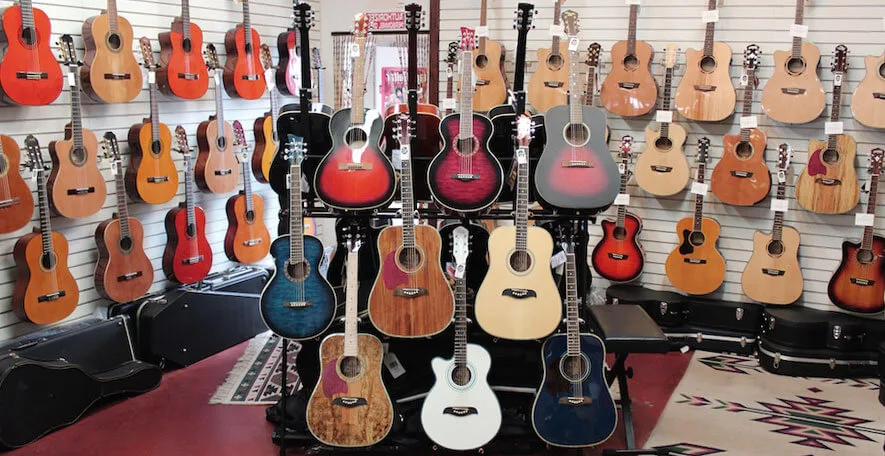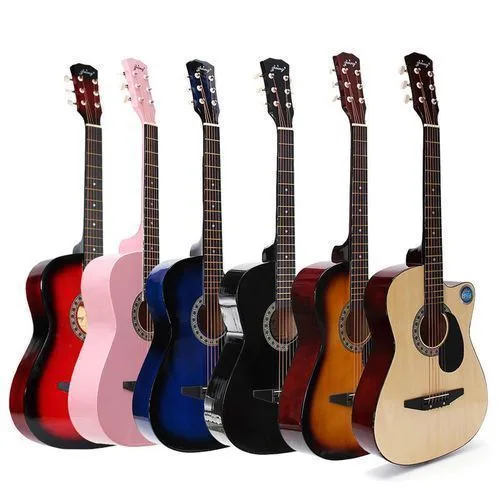Hey there music lovers! Are you interested in learning the guitar but wondering how much it will cost you? As a fellow guitarist, I understand the importance of finding a guitar that not only sounds great but also fits your budget. Trust me, I’ve been through my fair share of affordable and expensive guitars before finding my perfect match. So let’s dive into this ultimate guide to help you figure out exactly how much a guitar costs and what factors can affect its price.
In this article, we’ll cover everything from the different types of guitars available and their respective price ranges, to tips on how to find quality guitars at a reasonable price. Whether you’re just starting out or looking to upgrade your current instrument, by the end of this article, you’ll have all the information you need to make an informed decision. So grab your pick and let’s strum our way into discovering the true cost of owning a guitar!
So, how much is a guitar?
The price of a guitar can vary greatly depending on the brand, quality, and type. Generally, a beginner’s acoustic guitar can range from $100 to $300 while an intermediate level one can cost anywhere from $300 to $700. On the other hand, electric guitars tend to be more expensive with entry-level ones starting at around $200 and high-end models reaching thousands of dollars.
However, it is important to remember that price does not always equate to quality. A higher-priced guitar may have better materials and craftsmanship but it ultimately comes down to personal preference and playing style.
When looking for your perfect instrument, consider factors such as body shape (dreadnought or concert), wood type (spruce or mahogany), and string material (nylon or steel). These elements will affect the sound and playability of the guitar.
It is also recommended to try out different guitars in person before making a purchase. This allows you to get a feel for the instrument and determine if it suits your needs and preferences.
Additionally, keep in mind that there are options for purchasing used guitars which can often save you money without sacrificing quality. Just make sure to thoroughly inspect the condition of the instrument before buying.
In conclusion, there is no set price for a guitar as it depends on various factors. It is important to do research and consider your own needs when finding your perfect instrument within your budget range. Happy strumming!
Understanding the Different Types of Guitars and Their Average Prices
When you think about guitars, a whole world of variety opens up. There are several types to explore: acoustic, electric, and bass guitars. Each type has its unique sound and purpose in music. Acoustic guitars have hollow bodies that create warm, rich tones perfect for folk or country music. These can average around $200 to $800 depending on the brand and craftsmanship. Then there are electric guitars, which rely on pickups and amplifiers to produce sound. This style can range significantly in price from about $150 for beginner models to thousands for high-end brands like Fender or Gibson.
With so many choices available, it’s essential to consider what fits your musical journey best. Bass guitars usually have four strings and provide the deep rhythm foundation in bands; their prices start around $150 but can go higher based on features like active pickups or custom finishes. Investing wisely means finding a balance between quality and budget that suits your needs as a player—after all, each guitar tells its own story through music! Whether strumming softly by yourself or rocking out with friends, understanding these differences will help you make an informed choice when it comes time to buy one.

Read also: is ibanez a good guitar brand
Exploring Factors That Influence The Cost of a Guitar
When thinking about what makes a guitar expensive or affordable, numerous factors come into play. One significant element is the type of materials used in its construction. Premium wood, like mahogany or rosewood, not only gives a rich sound but also adds to the overall aesthetic appeal. Guitars made from high-quality materials are often more durable and can produce better tone quality over time. Craftsmanship also plays a crucial role; hand-crafted instruments generally carry higher price tags due to the skill and attention to detail involved in creating each piece.
Another factor influencing cost is brand reputation. Well-known brands that have established their names through years of excellence tend to charge more for their guitars because customers trust their products’ reliability and performance.
- The country of manufacture can affect pricing as well.
- Guitars made in countries with higher labor costs usually sell for more.
- Add-ons like custom features or electronics further raise prices.
Lastly, demand impacts costs too; popular models may see prices soar when they become hard to find or limited editions. Understanding these elements helps buyers make informed choices when shopping for their perfect instrument!
Tips for Identifying a Quality Guitar Within Your Budget
Finding a quality guitar can feel like searching for hidden treasure, especially if you’re on a budget. First, it’s essential to determine what type of music you want to play. Different guitars suit different styles; for example, acoustic guitars are perfect for folk and country while electric guitars shine in rock and blues. When you’re at the music shop or browsing online, look for reputable brands that offer good value without breaking the bank. Do your homework; read reviews and watch videos showcasing various models. This will help you gauge reliability before making any decisions.
Next, pay attention to the details when trying out different instruments. Check how comfortable the guitar feels in your hands; it should be easy to hold and play without strain. Listen closely as you strum each string—clear sound is key. Look for imperfections like cracks or warps in the wood since these can affect tone quality over time. Make sure adjustments like action height and intonation are spot-on too! Lastly, don’t hesitate to ask questions from knowledgeable staff—they can provide great insights that may point you towards finding an instrument that strikes just the right chord with both your musical aspirations and budget constraints!
Choosing Between New or Used Guitar: Evaluating the Best Options for You
Deciding whether to purchase a new or used guitar can feel overwhelming, yet understanding the differences between them can make your choice easier. New guitars shine with their pristine finishes and perfect craftsmanship. They often come with warranties that protect your investment and guarantee quality. You’ll find a wide variety of models, colors, and features, allowing you to select exactly what suits your style—whether it’s an electric riff-ready machine or a classic acoustic strummer. However, this freshness comes at a cost; new guitars tend to be pricier.
On the flip side, used guitars tell stories through their scratches and wear marks. Each ding represents years of music-making adventures! Buying secondhand can save you money while still delivering incredible sound quality if you choose wisely. Look for reputable dealers or local musicians who are selling cherished instruments they’ve outgrown. Although the selection might be limited compared to brand-new options, some vintage pieces have unique qualities that make them special treasures worthy of exploration.
Ultimately, consider factors like budget,
- personal taste
- and long-term plans
. Whichever path you choose—new or used—what matters most is finding an instrument that resonates with your musical journey!
You may also like: Who is Taylor Swift’s favorite singer
Conclusion: Making an Informed Decision on Your Guitar Purchase
When it comes to buying a guitar, it’s essential to gather as much information as possible before making your choice. A well-informed decision can enhance your playing experience and lead you toward the right instrument for your needs. Start by considering your skill level. Are you a beginner seeking something easy to handle, or an experienced player looking for quality sound? Different types of guitars suit various styles: acoustic, electric, bass—each with its unique charm and purpose. Exploring brands is also vital; some players swear by Fender while others love Gibson. Visiting music stores allows you not only to see but also to feel the instruments in person.
Additionally, think about how often you plan to play and where you’ll be practicing. If you’re mostly jamming at home, an affordable acoustic might work wonders without needing amplification; however, if you’re aiming for performances or band practices, investing in a solid electric could pay off in the long run. Don’t forget about budget constraints! Researching online reviews and comparing prices can guide you towards finding that perfect match within your price range. Ultimately, taking time with this process will ensure that when you finally pick up your new guitar, it feels like an extension of yourself—a true partner on your musical journey!

